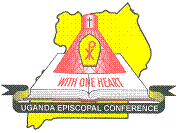UGANDA: UEC to roll out Justice and Peace Capacity Building Programs to Diocesan Coordinators

The Uganda Episcopal Conference Justice and Peace department in
partnership with the Aid Agency of the Catholic Church in England and Wales (CAFOD)
are developing new interventions in capacity building program for the diocesan
coordinators of Justice and Peace, which aims at ensuring efficiency of service
delivery at the diocesan level.
partnership with the Aid Agency of the Catholic Church in England and Wales (CAFOD)
are developing new interventions in capacity building program for the diocesan
coordinators of Justice and Peace, which aims at ensuring efficiency of service
delivery at the diocesan level.
In an interview with AMECEA
Online News, Dr. Emmanuel Aliba, head of Justice and Peace Department said that through the partnership with CAFOD the
department is planning to empower the diocesan Justice and Peace Coordinators through training in areas of parliamentary liaison, peace building, election monitoring
process, public expenditure monitoring and tracking and many other.
Online News, Dr. Emmanuel Aliba, head of Justice and Peace Department said that through the partnership with CAFOD the
department is planning to empower the diocesan Justice and Peace Coordinators through training in areas of parliamentary liaison, peace building, election monitoring
process, public expenditure monitoring and tracking and many other.
Dr Aliba commended CAFOD for journeying with them as their
traditional partner in all the activities for which they are grateful. “So far
CAFOD has seen us move from a very small department to now quite a big force in
the country especially in the areas of oil and gas activities where we are now
considered as strategic partners by government, oil companies and communities,”
said Dr. Aliba adding that the development was not achieved overnight but taken
quite some time and was very challenging.
traditional partner in all the activities for which they are grateful. “So far
CAFOD has seen us move from a very small department to now quite a big force in
the country especially in the areas of oil and gas activities where we are now
considered as strategic partners by government, oil companies and communities,”
said Dr. Aliba adding that the development was not achieved overnight but taken
quite some time and was very challenging.
He said, “Our first intervention in the oil and gas governance was
to make a mini baseline survey among the gas and oil communities and we
produced the document which we called the people’s voice for social justice.”
to make a mini baseline survey among the gas and oil communities and we
produced the document which we called the people’s voice for social justice.”
Dr Aliba explained that through the support from CAFOD, Justice
and Peace Department managed to lobby the local communities, the oil companies
and the government and successfully brought them together in a forum for
discussions, which yielded the formulation of oil and gas policy which has also
been translated into local languages.
and Peace Department managed to lobby the local communities, the oil companies
and the government and successfully brought them together in a forum for
discussions, which yielded the formulation of oil and gas policy which has also
been translated into local languages.
Another successful venture, according to Dr Aliba, is the
deepening of multi-party democracy in Uganda, a program which was carried out with
the support of CAFOD. “We targeted the district local councilors and
journalists to deepen their understanding of multi-party dispensation. We had
realized that people did not know what multi-party was and in order to work
best, you must know the theoretical and the practical background of multi-party
dispensation,” Dr. Aliba explained.
deepening of multi-party democracy in Uganda, a program which was carried out with
the support of CAFOD. “We targeted the district local councilors and
journalists to deepen their understanding of multi-party dispensation. We had
realized that people did not know what multi-party was and in order to work
best, you must know the theoretical and the practical background of multi-party
dispensation,” Dr. Aliba explained.
By Pamela Adinda, AMECEA Online
News
News


